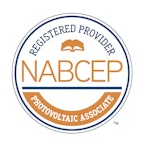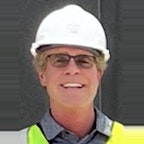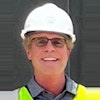This is a bundle of these 4 courses
About this course
- BPI Building Science Principles (BSP) Certificate of Knowledge - Master the fundamentals of how building systems interact to affect comfort, health, and energy efficiency. This is your essential foundation before adding solar or other renewables to any project.
- NABCEP PV Associate (PVA) - Earn the industry's most recognized solar credential with our proven 88% first-time pass rate. We guarantee you'll pass on your first try or we'll refund your exam fee.
- NFPA Certified Electrical Safety Technician (CEST) - Essential 6-hour electrical safety training using NFPA 70E standards. Learn to work safely around energized electrical equipment with approach boundaries and safe work practices.
- OSHA 10-Hour Construction - Meet workplace safety standards. Earn your official DOL/OSHA 10-Hour Card while learning about Focus Four hazards, PPE, and safety culture.
Subjects covered
Bundle outline
Course 1 •
8
modules
BPI Building Science Principles (BSP) Certificate Prep
Welcome • 5 assignments
Orientation Materials
Module 1 • 2 assignments
Introduction
Module 2 • 2 assignments
Heat and Insulation
Module 3 • 4 assignments
Air and Air Sealing
Module 4 • 2 assignments
Moisture and Moisture Control
Module 5 • 3 assignments
Mechanical Systems
Module 6 • 2 assignments
Conservation Strategies
Module 7 • 2 assignments
U.S. DOE Home Energy Score
Module 8 • 2 assignments
Final Exam - BPI Exam Instructions
Conclusion • 4 assignments
Feedback and Additional Resources
Course 2 •
6
modules
Solar PV Boot Camp + NABCEP PV Associate Exam Prep
Welcome • 22 assignments
Orientation Materials
Module 1 • 15 assignments
History of Solar, Markets and Applications for Solar PV, and Safety Basics
Module 2 • 15 assignments
Electricity Basics + Solar Energy Fundamentals
Module 3 • 18 assignments
PV Module Fundamentals and System Components
Module 4 • 22 assignments
PV System Sizing and Electrical Design
Module 5 • 26 assignments
PV System Mechanical Design, Performance Analysis, Maintenance and Troubleshooting
Also included in this module is Performance Analysis, Maintenance and Troubleshooting which goes along with Chapter 10 in Solar Photovoltaic Basics, which means you are getting close to the end!
Module 6 • 14 assignments
Practice Exams
Conclusion • 16 assignments
Feedback and Additional Resources
Course 3 •
0
modules
NFPA Certified Electrical Safety Technician (CEST) Exam Prep
Welcome • 1 assignments
Orientation Materials
Welcome • 2 assignments
Orientation Materials
Module 1 • 7 assignments
NFPA 70E 2021 Article, chapter and comprehensive practice exams
Module 1 • 20 assignments
NFPA 70E Electrical Safety Training
Module 2 • 7 assignments
NFPA 70E 2024 Article, chapter and comprehensive practice exams
- ✅ USE: Module 1 practice exams (2021 NFPA 70E-based)
- ❌ DO NOT USE: These 2024 practice exams for your current certification attempt
- 📖 Reference: Only the 2021 edition of NFPA 70E during your exam
- Your CEST certification requires renewal every 3 years
- NFPA 70E requires retraining in safety-related work practices and applicable changes to NFPA 70E at intervals not to exceed 3 years
- If you earned your CEST in 2021-2022, you'll likely need to recertify based on the 2024 edition
- Safety managers planning training updates
- Organizations preparing for the transition to 2024-based requirements
- Professionals wanting to stay current with electrical safety evolution
- Those who want to understand the direction of electrical safety standards
- Individuals comparing changes between editions for continuing education
- The transition timeline to 2024-based CEST exams has not been officially announced by NFPA
- Typically, there's a transition period allowing both versions before full adoption
- Monitor NFPA announcements for official CEST exam update schedules
Conclusion • 3 assignments
Feedback and Additional Resources
Conclusion • 5 assignments
Feedback and Additional Resources
Course 4 •
1
modules
OSHA 10-Hour Construction
Module 1 • 3 assignments
OSHA 10-Hour Construction Course
- Introduction to OSHA
- Fall Hazards
- Electrical Hazards
- Struck-By Hazards
- Caught-In Hazards
- Personal Protective Equipment (PPE)
- Health Hazards
- Materials Handling
- Tool Safety
Continuing Education Units
Approved for the following CEUs
- 30 AIA LU/HSW Credits
- 18 NABCEP PV Training Hours (passing score on the PV Associate exam required)
NABCEP Registered Provider

This course fulfills the training requirements to sit for the NABCEP PV Associate exam and HeatSpring is a NABCEP Registered PV Associate Provider.
Authors

Brynn Cooksey
Brynn Cooksey Sr., affectionately known as the "Air Doctor," is a Detroit native and the Owner of Air Doctors Heating and Cooling and HVAC U. Brynn earned that nickname for his renowned engineering solutions in the HVACR and electrical industries. After spending 15 years in the utility gas and power industry, Brynn took over his family's heating and cooling business and...

Sean White
Sean White was the 2014 Interstate Renewable Energy Council Trainer of the Year. He is an IREC Certified Solar PV Master Trainer and has authored several books on solar. He contributed to the development of the NABCEP PV Installation Professional Job Task Analysis and has been a member of the NABCEP PV Installation Professional Technical Committee. Sean is a...

Jason Brozen
As a professional safety instructor, expert witness, and consultant, Jason has made it his mission to share his experience to help others stay safe on the job. He is currently the Lead Corporate Safety and Technical trainer for Tyndale and an NFPA Certified Electrical Safety Compliance Professional (CESCP). Jason has been teaching the 70E for several years and has been...
OSHA Education Center is HeatSpring's official provider for OSHA training. Since 2012, OSHA Education Center has been delivering the training and regulatory expertise that professionals and employers need to stay up to date with industry training requirements. HeatSpring partners with OSHA Education Center to deliver 10- and 30-hour OSHA Outreach training, including...




